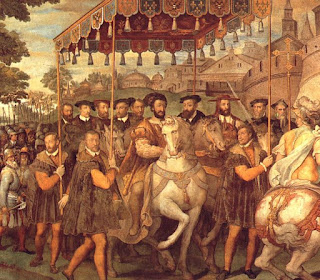Imagine for a moment that only two years after the 9/11 terrorist attack, President Bush announced that he was inviting Osama Bin Laden to pass through the United States on his way to Canada. Not only would the President guarantee America's worst enemy safe passage, he intended to organize parties and receptions at each of the cities along the route, culminating in an extravagant gala at the White House, which was being completely redecorated for the event. And, by the way, no politics would be discussed at all during the visit, for fear of forcing Bin Laden to make, for politeness's sake, concessions he otherwise would never consider.
What would your reaction be? SURPRISE, surely, if not outrage.
Such must have been the reaction of the French populace when they learned that their King, François I, had invited the Holy Roman Emperor, Charles V, to pass through France on his way to Ghent in 1539. Charles V and François had been mortal enemies for over a decade, ever since Charles captured François at the Battle of Pavia in 1525 and held him hostage for more than a year, releasing him only after receiving a huge ransom, François's two sons as hostages, and the king's pledge to marry his sister Eléonore. Seemingly perpetual war broke out between the two monarchs after François returned to France, with François determined to regain both his honor and the duchy of Milan, lost at Pavia. The campaign of 1536-38 was particularly devastating to France, with Charles invading and laying waste to huge portions of Provence. Encouraged by the Pope to unite against the Turk, the monarchs entered an uneasy truce in the summer of 1538. Then, in 1539, when Charles needed quick access to the Low Countries to suppress a rebellion there, François, to the consternation of many, invited the emperor to pass overland through France rather than travel by sea.
Of course this overture had political motives. François hoped to obtain through friendship what he had failed to win through war. In an effort to secure Charles's promise to marry his daughter to François's youngest son and grant the couple Milan as a dowry, François spared no expense or effort on this extraordinary visit. He met Charles in person in southwestern France and traveled with him north all the way to Paris. Cities along the route staged elaborate entries; François entertained his royal guest at his finest châteaux with feasts and jousts and pageants. A month of sumptuous December festivity left the sober, somber Spaniards aghast at the French king's extravagance. As promised by the
connétable de Montmorency (the chief promoter the king's new strategy), the subject of Milan was never broached directly while Charles was on French soil. Showered with expensive gifts and words of affection, Charles departed, promising to reach a decision regarding the proposed marriage soon.
And what decision did Charles reach? Surprise, surprise -- the wily emperor decided to keep Milan and marry his daughter elsewhere, humiliating François a second time and ensuring continued war between France and the Empire for years to come.
Surprised to see his strategy fail in such stupendous fashion, the
connétable de Montmorency could hardly be surprised to find himself disgraced and banished from François's court.
And you -- don't tell me you're surprised that I think this a splendid setting for a historical novel!
*******
This post is my contribution to my writing group's new
weekly topic challenge. Author Susan Spann, author of the forthcoming ninja detective novel CLAWS OF THE CAT (Thomas Dunne, 2013), will propose a topic on her blog each Monday and we each of us will respond. Marci Jefferson (author of THE DUCHESS OF RICHMOND, St. Martins, 2014) posted
her response on
Susan's blog. Amanda Orr, working on a novel set in New Orleans, "the poor man's Paris," posts about a surprise
9-months-in-the-making and its effects on her writing. Feel free to join in and post your link in the comments below!



















